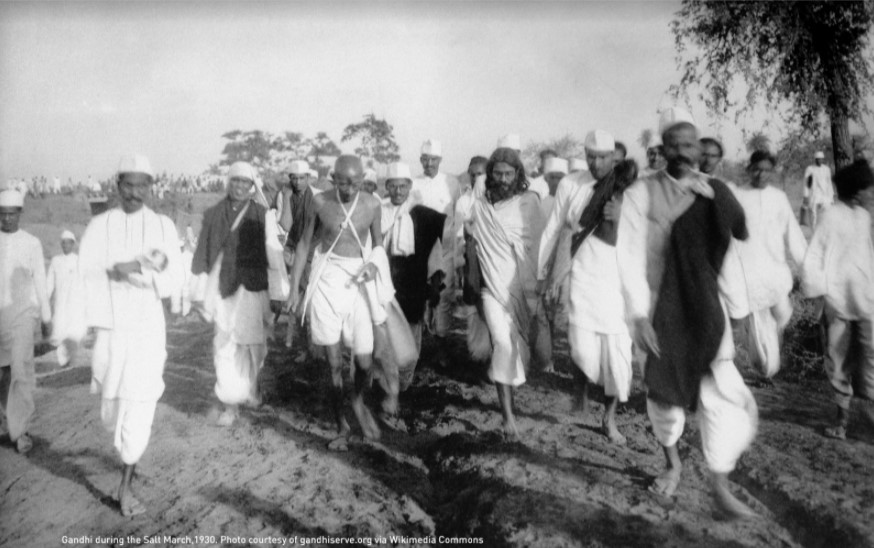
Confronted on a train while riding in the first-class compartment for which he had paid,
soft-spoken, brown-skinned Mohandas Gandhi recognized his treatment by railway officials
as unfair, even barbaric. To their humiliations he would never choose to become accustomed.
Incredulous, he repelled the insults, refusing their demands to move to a second-class carriage.
He reasoned, “I have a ticket for this seat.” But, to no avail.
For his resistance, he was thrown from the train, his luggage tossed beside him.
Young barrister, stylish and suited in the English way, he had pride and courage; he knew his place
was not on the ground, nor in the gravel.
Mild-natured, he rose from the earth and took aim, determined to speak and demonstrate his Truth
without fighting back. Resolute, he took the blows when they came.
His conviction grew: that Right Action would prevail, and violence fail.
In this, he remained unshaken.
Intelligent, educated, most clever, yet simple,
he knew his foes in the struggle; he could think just like them. Thus, he came to expect equal treatment.
Trained in law, familiar with nuance, he understood the Magna Carta from which British jurisprudence flowed,
the laws and protections which governed the lives of English citizens.
His inner reasoning was sound: Like you, we are industrious, self-reliant human beings, just of different color.
As Indian subjects of the British Crown, your laws and protections should apply to us.
Collective memory had not yet faded, it remained deeply etched in the plain:
The grain from our mouths you have taken; hunger in our homes and famine on our land was in your name.
You have claimed the livelihood of our weavers and artisans. All our wealth you have drained.
Shooting down a peaceful gathering of our people, how came the orders for such shame?
No longer will we tolerate such cruelty, disregard or anonymity. You have treated us with disdain.
In all your battles, we stood by you; we gave our sons, brothers, fathers and husbands for you.
Our earth and hearts are stained; this arrangement can no longer be sustained!
The time of atonement is here, the moment of reckoning most near: for our true loyalty and deep affection,
our sacrifices in your name, the tough scars which remain and may never be slain, we demand you
restore us with our freedom!
As fervor for India’s independence grew, Gandhi became more sure-footed and unflinching.
He showed us that when we gather we must band together, hold hands for our Truth,
act with Spirit to rectify past wrongs, recover self-rule in every step.
He insisted that when we march, we act with caution:
We must resist the dark abyss of violence, he proclaimed;
he knew we must dodge this Demon, skirt it assiduously, to prevail.
Reverend Martin Luther King urged the same,
to lift voices skyward to our Creator, but not raise arms;
to sound the gavel, call for justice, hymn the praises of nonviolence and the Lord.
The Reverend and our Mahatma called upon us, both with their conviction and their passion,
to gather, to march, with love in our hearts
to take back what God already granted each one of us:
the salt from the sea, our equality,
an understanding of our humanity.
For our rights, for our mother earth, for those who are silent or invisible,
peaceably we march. We each matter, each one of us.
With our intellect and will, and wit as well, we elevate our voices to resist injustice.
Do not despair: we raise no arms, we will not kill.
We will speak, we will chant,
we will sing of the common life we share,
encircle those who need our protection,
take back the lands of which we are the rightful heirs.
We must nourish and protect our Truth,
cultivate our trust in the peaceful fight, the boycott power of our changeable ways.
Principle and perseverance our weapons,
clever strategic thought is our way.
To change the hearts of others, our compassion and humility must grow.
To change the laws of this country, we must believe in each other and our imperative,
resist the wrongs bestowed.
If hope dims, the struggle too long, then
inspiration we can re-discover.
Our humanity will unite us;
neither color, nor creed divide us.
Let humility guide us.
We are strong, we belong,
worthy resistance we can sow.
Like this we march.
Poem by Ira Batra Garde. Ira (pronounced “Eera”) is a physician, poet, wife, and mother. She lives with her family in the San Francisco Bay Area and is currently at work on a novel exploring themes of history, culture, and psychological truth.
Podcast: Play in new window | Download
Subscribe: RSS









This is a beautiful poem that cleverly tells the story of a fascinating man – Mahatma Ghandi – and the struggle for independence in India. I liked the range of rhythms and the compelling narrative in a simple direct style.
I am reminded of the true story of when Ghandi re-visited London after he became famous. He was wearing his customary dhoti outfit being interviewed by the British press – when asked condescendingly what he thought about democracy in the UK he replied “I think it would be a good idea”. It’s good to know of Ghandi’s sense of humour as well as his fortitude and wisdom.
Thank you Andy. Please note that the spelling is Gandhi not Ghandi.